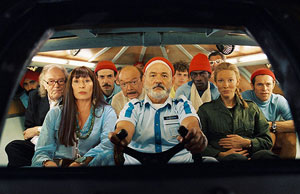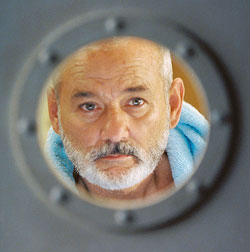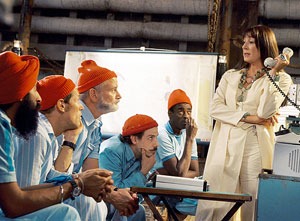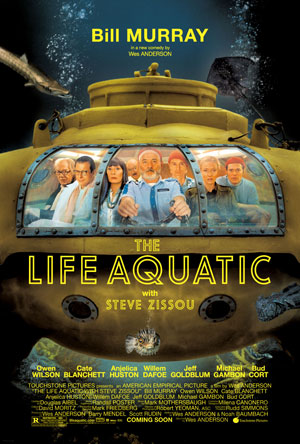Following up a film that seems to be aging slowly into a bona fide classic, a film that may well be considered your masterpiece, must be daunting at best. So how do you do it? If you’re Wes Anderson it seems that you make an action movie.
A Wes Anderson action movie, that is. No one is going to mistake The Life Aquatic with Steve Zissou for the work of John McTiernan, but it’s a film where Anderson opens up his palette a little bit. And it includes two actual gunfights, one where Bill Murray wears only a Speedo and a bathrobe.
The plot’s a meandering mishmash of characters and concepts orbiting one central idea – aquatic documentarian Steve Zissou is searching for the Jaguar Shark that ate his best friend Esteban. Zissou, an ersatz Jacques Cousteau, is watching his film career go down the tubes while his marriage also spins around the drain. He’s unhappy, and has been for the last ten years. Then the death of Esteban and the introduction of a new person into his life shake things up.
The new person is Ned Plimpton, a drawling pilot for Kentucky Air who may or may not be Steve’s son from a brief affair thirty years before. Steve quickly convinces Ned to join his next expedition, seeking the Jaguar Shark, and to possibly change his name to Kingsley Zissou. Along with the usual members of Team Zissou and a pregnant reporter and a bond company stooge, they set out only to find themselves waylaid by pirates, forced to rob supplies and finally come face to face with the mysterious leviathan Zissou is focused on.
Anderson stuffs the films to the gills with characters and relationships – he further complicates the Ned and Steve relationship by having them both fall for Jane (a luminous Cate Blanchett, left at the mercy of a script that seems to forget about her at times), the reporter. He has Steve’s wife, Eleanor (the stately Anjelica Huston, essentially reprising her Tenenbaums role), leave him for his adversary and her half-gay ex-husband, Alistair Hennessy (played wonderfully by a Jeff Goldblum who has finally exorcised that stutter he always has). Meanwhile a member of Team Zissou seethes with jealousy about the newcomer.
There’s more as well. Anderson does a mostly fine job of juggling his myriad characters, but in the end some, like Jane the reporter, seem to mostly fade out of the film. Bud Cort, who plays the bond company stooge, is essentially a MacGuffin of a character – he’s only there to be kidnapped by pirates so that the crew has something to do for the second half of the movie before they actually find the shark. By the way, the inclusion of Bud Cort in the film seems to me a way of Anderson to say that he’s completely indebted to Hal Ashby for his tone, and often his style.
 Maybe it’s that need to find things for the crew to do that lends Life Aquatic such a weird quality. When you’re making an action film you need to move your characters into places where they can have action occur, and unlike Rushmore or Tenenbaums, which allowed the characters to make their own way, to follow the paths decided upon by their own actions and choices, Aquatic forces outside element after outside element upon them. Life Aquatic may be the first Wes Anderson film with a real, actual bad guy in it – usually we see a very human side of even the baddest characters in his films, but here the pirates who drive the second half of the picture are barely even characters. Their three legged dog, Cody, who gets left with Team Zissou, has more going on than these bad guys.
Maybe it’s that need to find things for the crew to do that lends Life Aquatic such a weird quality. When you’re making an action film you need to move your characters into places where they can have action occur, and unlike Rushmore or Tenenbaums, which allowed the characters to make their own way, to follow the paths decided upon by their own actions and choices, Aquatic forces outside element after outside element upon them. Life Aquatic may be the first Wes Anderson film with a real, actual bad guy in it – usually we see a very human side of even the baddest characters in his films, but here the pirates who drive the second half of the picture are barely even characters. Their three legged dog, Cody, who gets left with Team Zissou, has more going on than these bad guys.
Another aspect of the film that leads it to be Anderson’s least so far is the character of Zissou himself. Bill Murray plays Zissou as a riff on Herman Blume, but with a different starting point for his ennui and depression. Still, what makes Blume so loveable in Rushmore is not only the way that he (excuse the pun) blooms when he falls for Miss Cross, but also the way he acts as the perfect foil for Max Fischer. Zissou doesn’t have that relationship with Ned, and while the strange relationship they do have is interesting, you often wonder why Ned wants to be this guy’s son so badly. Zissou’s a complete dick, and he doesn’t even seem to know anything about the ocean – at least Blume was truly in love with Miss Cross. Zissou has almost no redeeming qualities, and the movie never really offers him a redemption moment (although there are many who would argue with me that the final Jaguar Shark encounter is that moment, and they may have a point, although I think that’s a catharsis moment that allows him a future, unseen, redemption). Murray plays a dick incredibly well, and you never mind that you’re watching a movie about a complete dick, but that dickiness keeps you forever a touch distant from the movie’s emotional core. Where Rushmore and Tenenbaums featured quietly devastating moments, Aquatic has none of these.
Owen Wilson’s performance as Ned is seriously strange. He’s cartoonish in manner and speech, as well as action. He’s nice in every way that Zissou is a dick, and while you would think that the pairing of the two would offer interesting counterpoints, it really doesn’t. Part of that is just the fact that Ned is a sketch of a character, or maybe a character who should be in a sketch. He’s just undercooked enough to make him approach the level of a cipher.
The show is stolen by Willem Dafoe, who plays the German engineer Klaus, who is most envious of Ned’s newfound acceptance in Team Zissou. Klaus loves Steve like a father, and Dafoe’s menacing face and German accent imposed on the childish movements and motivations of the man are a hoot. Plus the character feels like he has all the depths that Ned seems to be missing. And Dafoe is hilarious.
motivations of the man are a hoot. Plus the character feels like he has all the depths that Ned seems to be missing. And Dafoe is hilarious.
Henry Selick gives the film some wonderful fish animations – too few, in fact. They hint at a whimsy that the movie wants but rarely achieves. Tonally, I wish that Anderson had gone with more Selick animation to bring the film to a more willfully strange place – while without a doubt the weirdest and most outlandish Anderson film, Life Aquatic also often feels weirdly hemmed in at times, like Anderson is afraid that if he goes too odd he won’t be able to get to the emotional centers of the story. Since he never gets there anyway it would be fun to see him be odder.
It sounds like I’m trashing the movie here – I’m not. It’s a good film, and it works on a very surface level. I don’t think Anderson can make a movie that isn’t engaging and fun to watch, and with The Life Aquatic he’s expanded his visual style. It’s a dynamically shot picture, which mixes and matches marvelous location footage of Team Zissou at sea with obviously stagey shots of the interior of the Belafonte, their boat, and standard sets. The assault on the pirate hideout late in the film perfectly brings all these elements together – the location shooting, while gray and overcast, is lovely, and the set design of the decrepit hotel where the pirates make their base switches back and forth from over the top delights to super realistic. I think that this reflects what Anderson wanted to do with the film’s tone.
What’s too bad is that The Life Aquatic doesn’t work on the deeper levels where Rushmore and Tenenbaums resonate. It tries – the movie continues Anderson’s obsession with family and what it is and what it means. Father/son relationships are peppered throughout the film, and there’s a lot to be discussed about how important it is that Ned is or is not Steve’s real son. But it all feels academic – the bookend appearances of Klaus’ boy don’t carry any weight but feel more like they’re necessary to keep the thematic element going so that when we all get together for drinks we can bullshit about it. There’s nothing wrong with that, but these thematic elements needed to be grounded in emotional reality, and the movie never allows us inside enough. Some people have said that the absence of Owen Wilson at the typewriter is the cause of this, but I think it’s just a function of the scope – Anderson’s made a very big and probably logistically complicated movie here, and what has suffered are the heartfelt moments.
 Even the least of the Wes Anderson films are damn good films. If you like Anderson and his style, you’ll walk out of The Life Aquatic having really enjoyed yourself. You may find a small disappointment that the film doesn’t reach to the previous heights the director has set, but those goals may be unrealistic. And you have to give the guy credit for stretching out – it would have been all too easy to make this same movie in the Tenenbaums mode and not bother to try anything new. The Life Aquatic with Steve Zissou is a film where we get to watch one of the most talented young filmmakers stretching his muscles and trying new idioms – who can complain about that?
Even the least of the Wes Anderson films are damn good films. If you like Anderson and his style, you’ll walk out of The Life Aquatic having really enjoyed yourself. You may find a small disappointment that the film doesn’t reach to the previous heights the director has set, but those goals may be unrealistic. And you have to give the guy credit for stretching out – it would have been all too easy to make this same movie in the Tenenbaums mode and not bother to try anything new. The Life Aquatic with Steve Zissou is a film where we get to watch one of the most talented young filmmakers stretching his muscles and trying new idioms – who can complain about that?
7.9 out of 10
